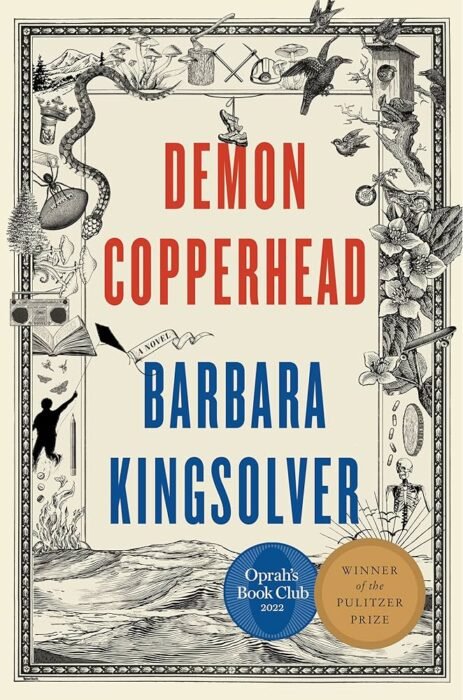Please scroll down for an English review.
ברברה קינגסולבר ידועה כסופרת בעלת מחויבות חברתית ואקולוגית. ביצירותיה היא נוהגת לבקר את הפגמים ההרסניים בתרבות האמריקאית, בין אם בהקשרים סביבתיים ובין אם דרך סיפורים על שוליים חברתיים. הרומן Demon Copperhead, שזיכה אותה בפרס פוליצר, משתלב במסורת זו ומציג מבט על עוני, התמכרות והזנחה במערב וירג'יניה.
קראתי בעבר שניים מספריה שעוסקים במשברים חברתיים־תרבותיים. הראשון, תורת עץ הרעל הבלתי נשכח, יצירת מופת העוסקת בניסיון האדם הלבן הנוצרי "לביית" את משפחתו ואת ה"בורים" בקונגו, ניסיון שתוצאותיו היו הרסניות. השני, חזירים ברקיע, מתמקד בהשפעת התרבות האמריקאית על האינדיאנים.
לעומתם, ב־Demon Copperhead היא בוחרת לרדת לשורשי העוני ולתרבות האופיאטים באפלצ'ים. הסיפור מתפתח דרך חייו של ילד, דמון, בעל שיער נחושת, שנולד לאם אלכוהוליסטית ומכורה לאופיאטים. בגיל חמש הוא נמסר לרשויות הרווחה, לאחר שאמו מתה.
קינגסולבר מוליכה אותו בתחנות חיים רצופות אסונות, הממחישות את אוזלת ידה של מערכת החינוך והרווחה. תקווה קטנה נוצרת כאשר הוא מתבלט בפוטבול, אך פציעת ברך מוחקת גם את החלום הזה, ודוחפת אותו להתמכרות לאופיאטים, בדיוק כמו אמו. רק אחרי ירידה ממושכת לשאול, הוא מצליח להתברג כאמן קומיקס ולזכות בהצלחה.
אבל כאן מגיעה האכזבה. ספרים רבים כבר תיארו עוני והתמכרות באפלצ'ים, חבל ארץ שהפך לחלק מ"חגורת החלודה", מוכת אבטלה ושקיעה כלכלית. ציפיתי מקינגסולבר, לאור כתיבתה המרשימה בעבר, לטלטלה גדולה, ואולי אף לשינוי תפיסת עולם. תחת זאת קיבלתי סיפור צפוי, מסלול חיים שאפשר היה לחזות כמעט בעיניים עצומות.
הבעיה המרכזית היא היעדר אמירה ייחודית. ספר בהיקף של 644 עמודים מאת סופרת בסדר גודל כזה, מועמדת קבועה לפרסים, חייב להציע משהו מעבר לשחזור מייגע של נתיבי עוני מוכרים. ב־250 העמודים הראשונים עוד חשתי אמפתיה כלפי דמון, אך משם והלאה חזרו וריאציות על אותו נושא: בן ההולך בדרכה של אמו, מערכת אימוץ כושלת, התמכרות חסרת תקווה, עד שכבר לא נותר לי רגש להשקיע בו.
גם הנרטיב עצמו היה חוזרני. את מה שהיא כתבה ב־644 עמודים ניתן היה לתמצת בחצי – אולי אפילו בפחות – מבלי לאבד את העיקר. היו פרקים שנגררו עד כדי שיעמום.
הוסיפי לכך את הביצוע באודיו: קול הקריין, גבוה באוקטבה אחת מדי, היה מנוגד לחלוטין לאווירת הספר, והפך את ההאזנה למעייפת במיוחד.
בסופו של דבר, Demon Copperhead איננו ספר רע, אך הוא בהחלט ספר מאכזב. הוא רחוק מהעוצמה ומהייחודיות של תורת עץ הרעל או חזירים ברקיע, ונשאר בעיני כרומן כבד־צללים שלא מצליח להתרומם מעל הסיפור הידוע מראש.
Demon Copperhead מנסה להיות רומן גדול על עוני באמריקה, אבל בסופו של דבר הוא נשמע יותר כמו הד לכתיבה שכבר נעשתה לפניו. קינגסולבר יודעת לגעת בכאב, אך כאן היא נכנעת לנוסחאות צפויות. בעיניי, זה ספר שמרבה להתריע אך ממעט לחדש, רומן שאפתני שהסתיים כעוד חוליה מוכרת בשרשרת הארוכה של סיפורי מצוקה אפלצ’יים.
Demon Copperhead/ Barbara Kingsolver
Kindle Edition, 644 pages, 2022
דירוג SIVI –
איכות אודיו –

Barbara Kingsolver is best known as a writer deeply committed to social and ecological issues.
In her works, she often exposes the destructive flaws of American culture, whether through environmental themes or stories of social margins. Her novel Demon Copperhead, winner of the 2023 Pulitzer Prize for Fiction, falls squarely into this tradition, offering a narrative focused on poverty, addiction, and neglect in the Appalachian region.
I have read two of Kingsolver’s earlier novels that grapple with cultural and societal crises. The first, The Poisonwood Bible, is an unforgettable masterpiece about a missionary family’s catastrophic attempt to impose Western Christian values on the Congo. The second, Pigs in Heaven, explores the cultural clash between mainstream American society and Native American heritage.
Compared with those works, Demon Copperhead descends into the roots of Appalachian poverty and the opioid epidemic. The story unfolds through the life of Damon, the “copperhead” boy born to an alcoholic, opioid-addicted mother. By age five, he is handed over to the welfare system, his fate sealed after his mother’s death.
Kingsolver follows Damon’s life through a series of calamities that highlight the failures of the American welfare and education systems. For a brief moment, football brings him visibility and hope, but a knee injury cuts that short, driving him into opioid addiction just like his mother. Only after surviving years of descent into despair does Damon manage to re-emerge as a comic book artist, finally tasting a degree of success.
And yet, here lies the disappointment. Countless books have already portrayed Appalachian poverty and addiction. This region, part of America’s “Rust Belt,” is no stranger to economic decline and social collapse. From a novelist of Kingsolver’s stature, I expected a transformative work — something that might reshape my outlook. Instead, I found a predictable trajectory, a life story that felt scripted well in advance.
The novel’s central weakness is the absence of a unique statement. A 644-page book by a Pulitzer-level author should deliver more than familiar tropes. The first 250 pages stirred my empathy for young Damon, but after that, the novel seemed to recycle itself: the son repeats the mother’s fate, the foster system is broken, and addiction is relentless. By then, I felt emotionally depleted, with little left to invest in Damon’s story.
The narrative, too, grows repetitive. What Kingsolver says in over 600 pages could have been told in half the length without losing impact. Entire sections felt drawn-out and monotonous.
An added frustration came with the audiobook performance. The narrator’s high-pitched voice clashed with the novel’s grim tone, making the listening experience even more grating.
Demon Copperhead is not a bad book, but it is a disappointing one. It never rises to the literary heights of The Poisonwood Bible or even Pigs in Heaven, and instead lingers as a heavy-handed retelling of an already familiar story.
Demon Copperhead aspires to be a sweeping American novel about poverty, yet ends up sounding like an echo of stories we have already read. Kingsolver knows how to touch pain, but here she succumbs to predictability. For me, it is a novel that warns loudly but innovates little, an ambitious project that falters into just another Appalachian tale of despair.
לגלות עוד מהאתר Sivi's Books
Subscribe to get the latest posts sent to your email.

